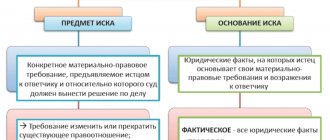Without consent When there is a change of owner Without providing other housing For non-payment Eviction of a minor
Read on our website also about how to evict unregistered and illegally residing citizens, as well as the owner himself, from an apartment.
About the opportunity
Is it possible to evict a registered person from an apartment?
Yes, you can . The resident is not the owner, which means that if there are appropriate grounds (for example, if a person is rowdy, endangers the living of neighbors, and simply does not pay for accommodation), he can be asked to leave and no court will be able to challenge this right.
This is possible both in the case of social rental (Article 83; 90 of the RF Housing Code) and private ownership (Articles 293, 249, 292 of the RF Civil Code; Articles 31, 91 of the RF Housing Code). Moreover, in the latter, it is enough simply that the extra person, as they say, “brown” the eyes of the owner (Article 31 of the Housing Code of the Russian Federation).
This is also possible in case of non-payment of the mortgage loan.
Eviction is possible in two ways :
- through the Management Company (if everyone agrees);
- through the court (if the tenant actively protests).
Find out how to evict an illegally residing or unregistered person from an apartment, as well as a former spouse or even the owner himself, on our website.
Minors
It is much easier to evict a tenant without a child. A different situation arises if the interests of a minor are affected. In such circumstances, the legislator has provided additional methods of protection.
Depriving a child of housing is permitted only when another object is provided in return. The area of the new premises must be equal to or greater than the size of the previous apartment. If parents or other legal guardians have their own real estate, the chances of vacating living space increase significantly.
How to register a newborn baby: detailed instructions
Causes
Registered residents are asked to vacate the premises for the following reasons:
- systematic failure to pay housing and communal services;
- planned sale of the apartment;
- non-residence for a long time in the disputed territory;
- the mother or father of the child was removed from the registration register (Article 20 of the Civil Code);
- destruction of the premises;
- threat to the safety of other residents;
- turning housing into non-residential premises (for example, a warehouse);
- the house is about to be demolished;
- the building has been transferred to the state or religious organization;
- the premises have been officially declared unfit for habitation or uninhabited;
- dismissal from service resulting in termination of the right to use official housing;
- further residence in this territory is considered impossible;
Read about the reasons for eviction from service housing in our article.
Grounds for forced eviction of a registered person
A person’s arrival at his place of residence involves affixing a registration stamp in his passport. Moving into the apartment occurs immediately after registration with the Migration Department (passport office). Therefore, in order to evict a person in court, the owner must provide compelling reasons.
Reasons to oblige a citizen to vacate living space:
- Accumulation of debts for housing and communal services - overdue payments must be 6 months or more.
- Inappropriate behavior, quarrels with neighbors.
- Expiration of the residential lease agreement.
- Residence at a different address for 3 months or longer.
- Re-registration of parents - if the mother and father move to another apartment, the common child moves out with them.
- Emergency housing - the threat of collapse of load-bearing structures.
- Inappropriate use of an apartment - creating a warehouse, illegally opening a hairdresser, garage, nursery, etc.
- Recognition of the premises as a non-residential object.
- Transfer of a privatized apartment to the municipality or state.
- Divorce with the owner of the living space.
- Sale of housing to a new owner.
In a word, the reasons can be very different - they are all at the discretion of the apartment owner, who has the right to act through the court. In addition, forced eviction is possible at the initiative of neighbors. For example, if temporary residents violate public order in every possible way, start rows, damage property in the house and do not react to comments in any way (see “How to evict noisy neighbors from an apartment?”).
Where?
What is especially interesting is that even a judge is not sure that he will ask himself this question. If you're lucky, go to another room. If you're unlucky, go outside. Other housing is provided if the state intervened in the plans for the house, or if we are talking about social rent.
The latter is possible even if the citizen is a willful defaulter, but his family has disabled dependents , minor children, or disabled people.
But for violations, they are evicted to housing on the principle “as long as it’s available,” that is, according to hostel standards. We are not talking about any improvement.
They are transferred to comfortable housing if the eviction did not occur through the fault of the tenant - for example, the building was transferred into state or church hands (Article 85 of the Housing Code of the Russian Federation).
How to evict a person from an apartment if he is registered in it?
Features and nuances of the process
If the evicted person does not agree with this decision of the owner, then in order to achieve the deprivation of his registration, the owner will have to collect really significant evidence. And especially if he does not have the opportunity to find other housing.
No other accommodation provided
The conditions of this procedure are stipulated in Article 91 of the RF Housing Code. It states that:
- There must be documentary evidence of significant violations.
- The owner must notify the evictee of his or her neighbors' complaints in writing.
- The owner of the apartment gave time to eliminate the violations, but his request was ignored.
And according to the same article, the following may be considered significant violations:
- Systematic violation of order, leading an immoral lifestyle and violating the rights of neighbors.
- Use of housing for purposes other than its intended purpose.
- Deliberate actions that led to its destruction.
- Inadequate maintenance of the home.
More information about eviction without provision of other housing can be found here.
Enforcement
During this process, bailiffs must be present there . They are required to ensure that the residents actually leave the apartment. According to Art. 107 of Federal Law No. 229, bailiffs have the right to attract employees of specialized organizations to gain access to the premises or other things.
From council housing
For voluntary eviction from a municipal apartment, the desire of the resident is sufficient.
He can simply go to the police department and write an application for deregistration (or simply get discharged and registered), writing an application for discharge from one place and registration at another address.
It is not even necessary to indicate a valid residential address. For the procedure you only need a passport.
The situation is somewhat different with a minor child. Voluntary is one thing - the board of trustees in this case completely relies on the mother (Article 20 of the Civil Code of the Russian Federation), who is discharged from one apartment and moves to another.
But forcibly, especially if we are talking about obviously worse living conditions (not to mention being discharged “to nowhere”), it will not be possible even through the court.
Court cannot be avoided in other cases when the tenant does not want to quickly get out of the apartment. The initiator can be both the prosecutor's office and the Management Company , and even residents whose rights have been violated.
True, the housing department will first give the violator the opportunity to eliminate the problems he has created, which he will inform about in written notifications sent by registered mail under a personal signature.
They must then be attached to the package of evidence if the case goes to court. Because if the judge gets the impression that they didn’t try “in a good way” with the tenant, he will reject the claim.
The statement of claim is submitted to the district court in the number of copies according to the number of participants in the procedure. It must contain:
- full name of the court site;
- who declares;
- information about the defendant;
- what is the essence of the problem;
- were conversations held with the violator, were they required to eliminate the violations, if so, what result did this lead to;
- demand for eviction;
- list of attached documents;
- date, signatures.
What documents will be required in addition to the claim?
- general civil identity card;
- social rental agreement;
- technical documentation;
- a copy of the financial and personal account;
- extract from the house register;
- acts and testimony of the district police officer, service experts;
- photo and video materials;
- housing and communal services receipts;
- state duty check;
- correspondence, both electronic and paper - notification stubs, copies of letters.
The procedure for getting rid of an extra tenant will not be long - only three months . The first two will hear and consider the case, then another month is given to the defendant to appeal the claim. Then the court decision will come into force and is sent to the FSSP to implement the will of the state.
Is it possible to evict without going to court ? Yes.
For this purpose, an order from the prosecutor's office is sufficient if there is accommodation in an unsafe or dangerous premises, as well as in the case of unauthorized occupancy.
Who cannot be evicted
In some situations, it is impossible to evict a tenant from a municipal apartment. The ban applies to:
- minors or incompetent citizens of Russia, since this category enjoys protection from the state, in particular, their eviction will require the consent of the guardianship authorities, who will not agree to infringe on the interests and rights of children and incompetents;
- low-income people who are unable to earn money and provide for themselves, including buying their own housing, after the loss of municipal space, will actually remain on the street;
- elderly people, retirees and recipients of disability pensions, war veterans;
- persons left without parental care cannot be left without housing even during the demolition and forced resettlement of a municipal apartment - the administration is obliged to provide them with equivalent premises.
?
From private property
How to evict a registered person who is not the owner from an apartment? Everything will be simpler here; the owner can even do without going to court . But more on that later.
He also does not have the right to just take and kick out an annoying tenant - he will first need to notify him in writing (Article 35 of the Housing Code of the Russian Federation).
He may refuse, then a corresponding act is drawn up in the presence of two witnesses.
For voluntary eviction, it is enough to visit the passport office of the Department of Internal Affairs or the Management Company and submit the appropriate application.
If the tenant is against it, then the issue will have to be resolved through the court.
And in the event of eviction from a private apartment, he will be less scrupulous than in the issue of a municipal one. refuse a private owner to remove persons unrelated to him from his territory.
But if the defendant convinces the judge that he has nowhere to go , the servant of the law will give him a month’s deferment to resolve the housing issue. He will be especially strict if the tenant has minor children.
Therefore, in difficult cases, apartment owners often prefer to do the following: they simply sell the apartment with encumbrances (it is clear that the price will be slightly lower) and buy a new one.
Well, the new owner , offering to first clean up in an amicable way (that is, by sending a written notice), and if this does not work, then through the court.
In this case, the tenant is evicted without providing alternatives and usually without any objections (Article 292 of the Civil Code, Article 31 of the Housing Code).
The claim is drawn up according to the same rules as in the case of a municipal apartment. The required documents will require:
- general passport;
- ownership documents;
- extract from the house register;
- evidence of the impossibility or undesirability of a person’s further residence in the disputed territory;
- state duty check;
- correspondence with the tenant.
When can they refuse?
Typically, applications are rejected due to insignificant reasons or simply because the document is simply incorrectly drawn up. But a court decision may be made against the plaintiff if:
- The plaintiff and defendant are relatives, and there are no significant grounds for evicting the latter.
- The person being evicted is a minor, and the other parent does not have the opportunity to register. More information about the eviction of minor children from residential premises can be found here.
- The person being evicted is legally incompetent.
- The evidence for eviction is insufficient or insignificant.
- If the evicted person does not have additional housing in which he can register after eviction (however, in most cases this factor does not affect the court’s decision).
How to evict a roommate
The issue of eviction of a cohabitant requires legal grounds. The procedure always begins with filing a claim in court. The following circumstances may be the reason:
- Desire of the owner or shared owners of the property.
- Property damage charges.
- Violating the rules of residence and causing inconvenience to neighbors.
The court also takes into consideration other grounds that are indicated in the statement of claim. Their essence should be clearly stated. The main emphasis is usually on the relationship between the homeowner and the cohabitant.
Relationships between spouses
When formalizing through the court the deregistration of a former spouse who, after a divorce, lives in an apartment that is not common property, it is necessary to confirm the fact that the person has lost the right to use this living space. A prerequisite here is the absence of the fact of jointly acquired property and privatization. That is, the apartment must be received by the citizen before he formalizes the official marriage. Civil marriage does not count.
Despite the fact that the spouse loses the right to use the apartment automatically in accordance with the norms of the Housing Code of the Russian Federation, it is necessary to confirm this through the court. Next, the Federal Migration Center should submit a certificate of divorce and a court decision.
In addition to the wishes of the legal owner and the fact of an official divorce, the court will take into account such nuances as the incapacity and incapacity of the former spouse. Factors confirming that the ex-spouse is low-income and has no other housing can also complicate the process. Such citizens retain the right to live in an apartment for a certain period or until certain conditions are met.










